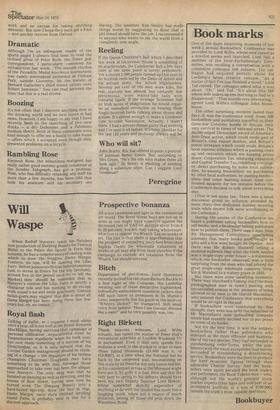Book marks
One of the more surprising moments of last week's annual Booksellers' Conference was provided by Lord Willis, whose new career as a novelist seems well launched. Lord Ted, a member of the Inter-Parliamentary Committee, was recalling a conversation with a committee colleague last autumn. The colleague had enquired politely about his Lordship's latest creative venture. -As a matter of fact I've just finished a novel," Lord Ted replied. The colleague asked what it was about. "Oh," said Ted. "It's about this MP whose wife wakes up one morning to find he's disappeared." "That Sounds very interesting," agreed Lord Willis's colleague John Stonehouse.
The other surprising moment lasted four days. It was the conference itself. Some 350 booksellers and publishers travelled to their three-star Coventry hotels to discuss their very survival in times of national stress. The double-edged Damoclean sword of America's Anti-Trust action, which could erode part of Britain's vital export market, and Britain's postal increases which could erode Britain's book exports; inflation which is pushing costs up and restraints which are keeping prices down; Corporation Tax inhibiting expansion and Capital Transfer Tax inhibiting continuity; direct purchasing by some local authorities, by-passing booksellers; no purchasing by other local authorities, by-passing books — these and other burning issues were confronted squarely for ten minutes before the Conference decided to talk about everything else.
(That is not quite fair. There was a small discussion group on inflation, attended by some thirty-five dedicated Sunday morning souls while decent folk were worshipping in the Cathedral.)
During the course of the Conference we heard a publisher telling booksellers how to sell books, and a bookseller telling publishers how to publish them. There was a man from PA Management Consultants concluding solemnly that many books were9bought as gifts and a few were bought on impulse. And there was Mr Robert Maxwell telling a stunned audience that what the trade needed was a single-copy order house — a statement which, one bookseller observed, was a little surprising from the man who had piloted the great single-copy wholesale company Simp' kin & Marshall to a watery grave in 1955.
But there were some satisfying moments. There was Hatchard's Tommy Joy (`the most photographed man in town') purring with unconcealed ecstasy at the prospect of being allowed to sit next to Mr Harold Macmillan, who assured the Conference that everything would be all right in the end.
If booksellers were comforted by that thought, they were less so by the behaviour of Mr. Macmillan's own publishing company which had recently decided not to put prices on some of its books.
Not for the first time, it was the unlikely booksellers rather than publishers who emerged as the more efficient and businesslike of the two species. They had succeeded in standardising order-forms, whilst the publishers (with the usual exceptions) had merely succeeded in standardising a deteriorating service. Booksellers were the ones to produce the hard economic figures through their admirable Charter Survey. And the booksellers once again paraded the book trade's star performers, the Book Tokens men — who, although not the world's greatest stock market experts (they have just sold part of an investment portfolio at a loss of £100,000) remain the trade's most capable operators.
Bookbuyer


























 Previous page
Previous page